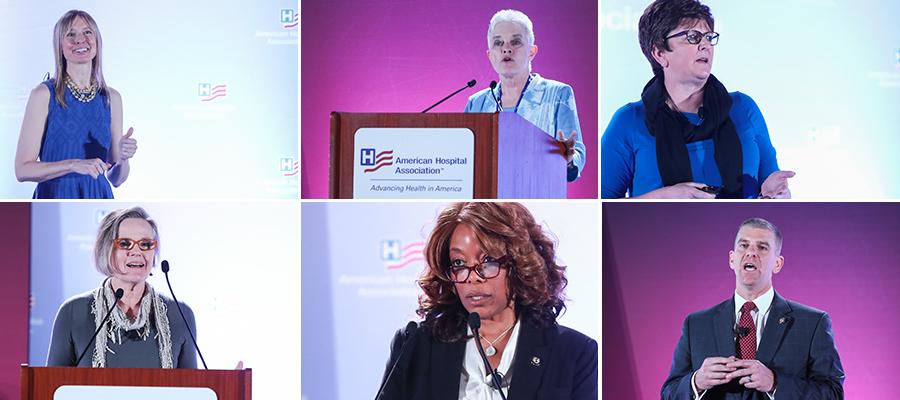Special coverage from the 2020 AHA Rural Health Care Leadership Conference

AHA Chair on Working Together for Rural Health Care. AHA Board Chair Melinda L. Estes, M.D., today kicked off the AHA Rural Health Care Leadership Conference by welcoming more than 1,000 rural hospital and health system leaders and trustees — the largest number of attendees in the conference's history. Estes underscored the challenges rural hospitals face, from low patient volume to heavily relying on public payer programs, to the growing opioid epidemic. She discussed how rural hospitals and health systems are evolving to meet the needs and demands of an ever-changing health care landscape so that they continue to survive and thrive. Estes emphasized the need to enact new federal policies and invest in rural hospitals and health systems to help them continue serving their communities for years and decades to come. "The state and strength of rural health care is critical to the fabric of American health care," Estes said. "And it is our singular mission to safeguard it, improve it, expand it, and advance it for future generations."
AHA kicked off the conference with a video showcasing rural hospitals and health systems nationwide caring for patients in their communities.
Addressing Disruption through Innovation and Value in Rural Communities. A panel of health care leaders, moderated by AHA Board Member Peter Wright, president of Bridgton and Rumford Hospitals, explored today's key challenges within the health care field. The panel included AHA Board Member Roxie Cannon Wells, M.D., president of CFV Hoke Healthcare/Hospital; Darrold Bertsch, CEO of Coal Country Community Health Center/Sakakawea Medical Center; Dave Ressler, CEO of Aspen Valley Hospital; Casey Cooper, CEO of Cherokee Hospital; Rachelle Schultz, president/CEO of Winona Health; and Alison Page, CEO of Western Wisconsin Health. The leaders shared how their organizations are redesigning care delivery, collaborating and transforming to reduce cost, improve outcomes and enhance the patient experience.
Keynote Sessions. Kelli Harding, M.D., assistant clinical professor of psychiatry at Columbia University and an author, explored scientific evidence to reveal how surprising hidden factors — such as kindness, love, friendship, environment, community and connection in our day-to-day lives — can have a far greater impact on overall health than anything that happens in the doctor's office. John Nance, ABC News aviation analyst and patient safety advocate, discussed how the health care system is moving from a fee-for-service world to one based on quality and effectiveness of outcomes. He detailed how organizations can succeed by empowering, motivating and inspiring their own staff members.
Strategy Sessions. A number of strategy sessions focused on preserving rural access; physician partnership and recruitment; creating alignment for success in transitions of care; changing the payment paradigm with a focus on the Pennsylvania Rural Health Model; what boards and executives should know about community benefit; engaging local leaders to drive policy changes and care delivery innovations; and making your board a model of governance excellence.
Roundtable Discussions. Roundtable discussions covered guiding trustees to understand the medical staff; enhancing physician resiliency and reducing burnout in rural health care practices; health equity and disparities; strategic questions boards should ask about information technology; attracting, recruiting and retaining great employees; and telehealth.
For more from the conference, click here and follow the action on social media using #RuralHealth.

